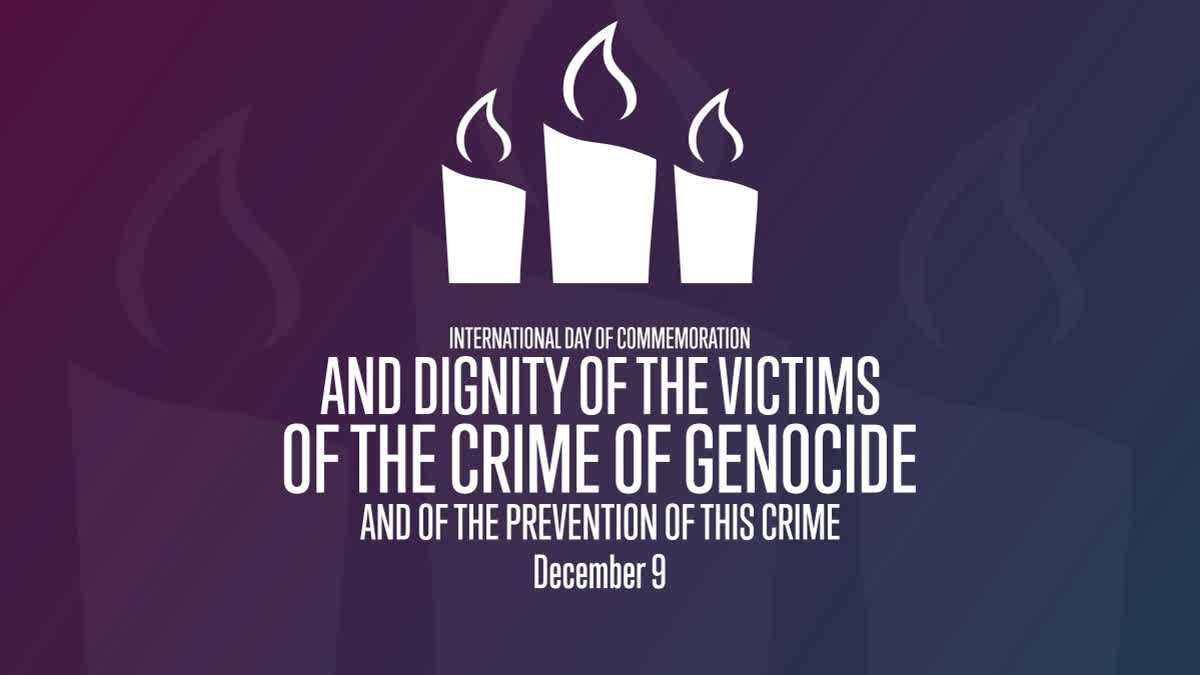December 9 is observed every year as International Day of Commemoration and Dignity of the Victims of the Crime of Genocide and of The Prevention of this Crime, marking the anniversary of the UN Genocide Convention. Every year the United Nations Office on Genocide Prevention and Responsibility to Protect organizes events to mark this International Day, honoring the victims of genocide and the anniversary of the Convention.
Every 9 December, the United Nations Office of the Special Adviser on the Prevention of Genocide marks the adoption of the Convention on the Prevention and Punishment of the Crime of Genocide – a crucial global commitment that was made at the founding of the United Nations, immediately preceding the Universal Declaration of Human Rights.
History: Since 2015, the United Nations has marked the International Day of Commemoration and Dignity of the Victims of the Crime of Genocide and of the Prevention of this Crime, which is often referred to as Genocide Prevention Day.
The date marks the United Nation’s adoption of the 1948 Convention on the Prevention and Punishment of the Crime of Genocide. Following the horrors of the Holocaust, the convention outlined the international community’s commitment to ‘never again’ and defined genocide, a term which had been coined by Raphael Lemkin. The day after this, on 10 December 1948, the first human rights treaty was adopted by the General Assembly of the United Nations.
The Genocide Convention defines genocide:
- Killing members of the group;
- Causing serious bodily or mental harm to members of the group;
- Deliberately inflicting on the group conditions of life calculated to bring about its physical destruction in whole or in part;
- Imposing measures intended to prevent births within the group;
- Forcibly transferring children of the group to another group.
Origin of the Term Genocide: The word “genocide” did not exist prior to World War II. It is a specific term coined in 1942 by Polish-Jewish lawyer Raphael Lemkin (1900–1959) and first used in print in his 1944 book, Axis Rule in Occupied Europe.
Genocide as an International Crime: After the Holocaust, the word “genocide” was established as a legal term for a specifically defined international crime.
10 facts everyone should know about genocide:
1. Genocide leads to mass poverty. As seen in German ghettos under the Nazi regime, and in Rwanda’s, Bosnia’s and Herzegovina’s staggering poverty rates, genocide is not a stand-alone issue but rather one with many other branches of issues.
2. Genocide promotes poor infrastructure. When citizens cannot afford basic sustainability or are too poor to contribute to the tax pool, things such as well paved roads and access to electricity become luxuries and not expectancies. Healthy and functioning infrastructure promotes an overall health in an economic system. However, where infrastructure is lacking, it is sure to impact personal financial success and vice versa.
3. Genocide increases crime statistics. Because genocide increases the likelihood of living in poverty, genocide indirectly increases the likelihood of crime. According to Marcus Felson, a criminologist, developing countries have more severe poverty than developed countries.
Developing countries lack affordable access to advanced security tools that exist in developed countries, such as home security systems, which deter crime. With less reliable protection against crime, citizens may find themselves in an environment where crimes are easier to commit.
4. Genocide disrupts schooling. Genocide devastates every aspect of an impacted community. Some major disruptions include weakened infrastructure, which in turn devastates school systems and access to education.
5. Genocide creates a lack of workforce, inhibiting a functioning economy. The most obvious result of genocide is a decrease in prior population. When this is paired with a weakened infrastructure and widespread poverty, the economy suffers greatly as there is reduced resources available to invest.
6. Genocide goes hand-in-hand with poor government systems. As seen in Nazi Germany and the genocide of over six million Jewish people, genocide is linked to totalitarian government regimes, similar to what is seen in modern day North Korea. Moreover, genocide paves the way for unstable governments to take power for extended periods of time.
7. Genocide cripples healthcare systems. Pre-civil war Rwanda had high rates of HIV/AIDS. However, due to sexual violence associated with the war, the rates of HIV/AIDS increased even further. The Rwandan government become nearly destitute from the war and consequently had a limited resource pool to draw from in order to treat citizens. Another example is seen in Bosnia and Herzegovina, where a devastated health care system from the Bosnian War still pervades.
8. Genocide targets minorities before any other group. This is likely due to the “black sheep syndrome” that sometimes pushes minority groups to the fringes of society, not wholly integrating or fitting in with the larger society. This makes it easy for minority groups to be identified and targeted.
9. Genocide leaves impacted societies vulnerable for many years after. While it is intuitive to assume that a society will not simply “go back to normal” when a genocide has ended, this is caused not by fiscal challenges but overall social distrust and emotional poverty, symptoms of the larger trauma. This is evident in nations like Rwanda, Bosnia and Herzegovina, where tensions and vast poverty are still present many years after the genocides.
10. Genocide can be prevented. Genocide does not come about by a single factor, but rather by many single decisions to ignore humanity in others. Every single person has both the opportunity and the responsibility to treat others with respect and dignity. Each person is a factor in deciding what kind of world we all live in and everyone can choose what kind of impact to make. Choose kindness.



